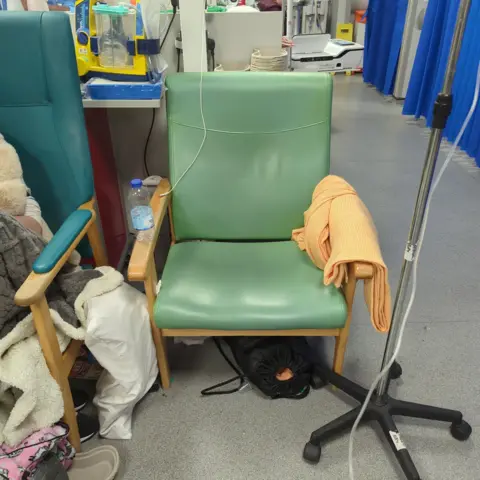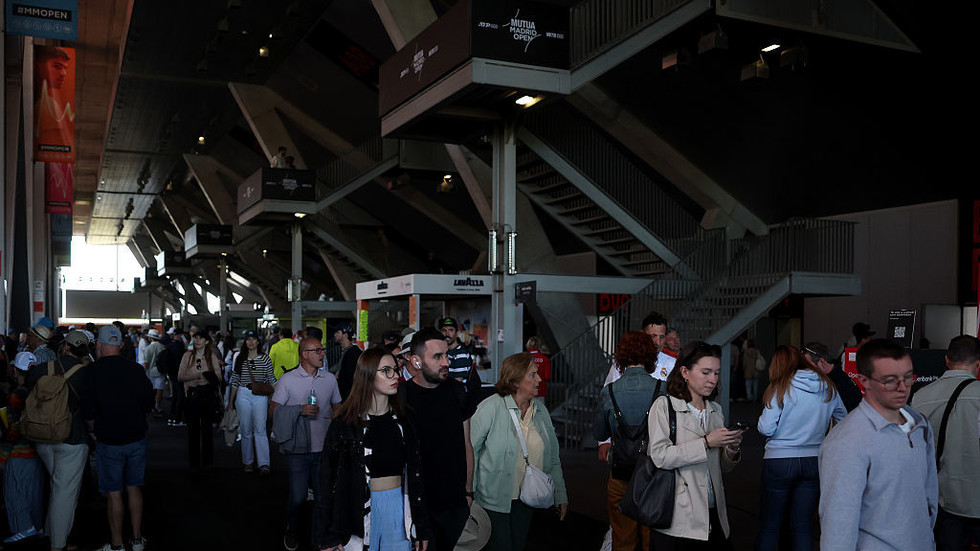Jenny Rees
Health correspondent, BBC Wales News

 PA Media
PA Media
Doctors say that patients are at greater risk of developing pressure sores if left on chairs and trolleys
Nurses and doctors in Wales have issued a joint petition calling on the Welsh government to end the "dehumanising" treatment of patients in hospital corridors.
Two unions representing NHS staff want the public to sign and support the call as they feel it has become normalised for people to be treated in "undignified environments" where they are at risk of significant harm.
One doctor spoke of patients being treated 50cm away from each other, such are the cramped conditions in emergency departments.
The Welsh government has been asked to comment.
"Sitting on a chair or being in a corridor on a trolley is not only uncomfortable, there's also a complete lack of dignity. It's dehumanising," said Dr Nicky Leopold, a consultant geriatrician who sits on the Welsh consultant committee for the British Medical Association (BMA).
Pressures on hospitals increased dramatically following the pandemic, with an increased demand on services and growing difficulty to safely discharge patients because of shortages in social care.
This has lead to poor patient flow through hospitals, with fewer available beds increasing waits in A&E or outside hospitals in ambulances.
Concerns raised by staff with BMA Cymru and Royal College of Nursing (RCN) Wales include:
- Patients with severe bone injuries sitting in chairs for up to 72 hours
- Patients discharging themselves against medical advice as they cannot stand to stay in a chair any longer
- Pressure sores or damage because of the time spent in chairs or in an ambulance
- A lack of access to water, food and toilets, particularly for the frail
- Patients never go home because they deteriorate so much during "corridor care"
- Patients wearing cardiac monitors regularly having seizures in chairs
- "Not uncommon" for patients to collapse and die in the waiting room


Helen Whyley of the Royal College of Nursing Wales said treating patients in corridors was "not nursing – it is crisis management in a system that is failing"
Dr Leopold said conversations and symptom discussions were much harder if patients cannot fully be examined or are nervous in a more public setting, compromising care and potentially leading to "overtreatment" as a safety net.
As a doctor specialising in care for the elderly, she said "frail, older adults" could often not recover from getting ill in hospital.
People not being able to stay mobile while being stuck in A&E could also lead to "secondary consequences".
This means when they might have been able to be discharged they were unable to as they "need lots of care and, of course, we all know that care is not available".
There are signs that discharging delays are starting to fall, but in March there were more than 1,300 patients in Wales who were medically well enough to be discharged but had to stay in hospital - mostly due to assessment issues or care home placement arrangements.
Wales has seen a fall in the total number of hospital beds in recent decades, in line with a longer term strategy to provide care closer to home by increasing community and GP services.


Dr Nicky Leopold said it can be particularly distressing seeing frail patients experience delirium when being cared for in corridors
The BMA and RCN want the Welsh government to take urgent action to:
- Make it a "never event" that patients receive care in a chair longer than 24 hours, meaning these occasions have to be recorded and reported
- Pause further cuts in hospital beds
- Invest in community based care such as district nurses and general practice
- Prioritise prevention and early intervention to ease pressure on A&E
Helen Whyley, executive director of RCN Wales said: "We are beyond breaking point.
"I have travelled across Wales and witnessed people in pain, confused and frightened, with no privacy, no dignity and no proper care environment."
Stephen Kelly, chairman of the BMA's Welsh consultants committee said added: "We're extremely concerned that the 'normalising' of seeing patients in completely inappropriate spaces will mean that patients come to significant harm which is hugely distressing for patients but also NHS staff."
Dr Leopold said about a quarter of older patients experience delirium, where there is a sudden change in brain function, which can be distressing for patients and their loved ones.
In cases such as this, having quiet space, getting out of bed and having food "all helps" but "we know we're making that worse" for people who are hallucinating while stuck in corridors with the lights on and constant noise around them.
"I find that particularly distressing when you know there are little things that could be done an awful lot better, but there's no facility to do it," Dr Leopold added.
She also said it caused "moral injury" to many staff who fear any complaints made to the governing bodies would point the finger at doctors and nurses rather than problems with the system.
She added: "Because whoever you are – even when you're the most important person in your organisation, you cannot influence what's going on in social care, for example. Just as social care cannot influence what's going on in healthcare."

 4 hours ago
5
4 hours ago
5









